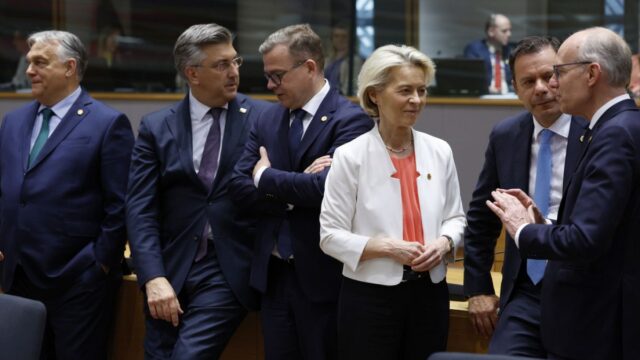The leaders of the 27 Member States will meet in Brussels next week to finalize and approve the EU political roadmap set out by leaders in the European Council.
The Russian invasion of Ukraine will have a significant impact on the development of the European Union’s Strategic Agenda for the next five-year termas it continues to have profound repercussions on the bloc’s energy, economy and security.
The Strategic Agenda is the EU political roadmap established by leaders in the European Council and which will guide the work of the next European Commission for the period 2024-2029.
The Green Deal, which encompasses historic legislative measures aimed at ensuring that the continent is carbon neutral by 2050 and which gained importance after the EU tried to divest itself of Russian fossil fuels following its attack on Ukraine, must continue to occupy a central place.
And that despite the fact that in recent months some parts have been softened after the widespread farmers protests and on the eve of the European elections. But the focus will be different.
“Green policies will experience a new turn in Europe“, Simone Tagliapietra, member of the Bruegel thinktank, told Euronews. “These policies will be put at the service of competitiveness, on the one hand, and security, on the other.” “This makes sense because in the last five years we have legislated a lot for the European Green Dealand now we have to move on to its application,” he added.
China and the United States
But the geopolitical circumstances that influence the Strategic Agenda, which the analyst described as “new turbulent waters”, They go beyond the war in Ukraine.
The China’s unfair trade policy and the need to establish partnerships to obtain raw materials and new markets, especially in Africa and South America, also will guide the work of the EU.
But the need for a “strong and secure” Europe, as well as “prosperous and competitive”through greater industrial capacity, both civil and military, also aims to reduce dependence on the bloc’s main ally, the United States.
“There is another element that is very important: the american elections and what will happen if (former President Donald) Trump returns to the White House. What will happen to Europe in terms of their own defense capabilities in the event that, say, the US retains some support in the context of NATO?” asks Tagliapietra.
New financial resources
Another pending issue for EU leaders is How to get the money you need to finance your ambitions. According to the Bruegel analyst, there are three possible sources of income that should be reformed.
“First of all, we have to do better use of the European budget. We should discuss how we are going to spend this money and what its amount will be, “he said.” Secondly, the European Investment Bank, which will undoubtedly play a role. a bigger role in the coming years in relation to all these elements. And finally, the new debt. Will there be a possibility of creating a new credit line once the Next Generation EU program ends, in 2026? “, he asked.
The draft agenda also includes a chapter called “Free and Democratic Europe”, to strengthen the rule of lawas well as a part on enlargement and how to prepare for a new wave of members, including Ukraine, Moldova and the Western Balkan countries.
“The expansion implies that countries that want to join have the ability to apply EU law, which demands many reforms in these countries and will also require new governance at EU level,” Tagliapietra said.
“Therefore, we will also have to rethink the way we make decisions: the unanimity we currently have on foreign policy may have to be reviewed in the future, because It is not conceivable to have veto power for any country if the club expands further“he added.
EU leaders are expected to finalize and approve the agenda at their next summitwhich will be held in Brussels on June 27 and 28.







